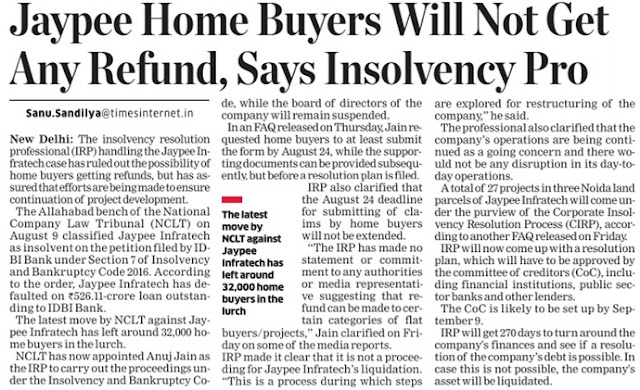WHETHER A FLAT PURCHASER CAN BE
REGARDED AS AN OPERATIONAL CREDITOR UNDER IBC 2016,CODE?
WHO IS A FINANCIAL CREDITOR UNDER IBC 2016?
Section 5 (7)
of the IBC Code defines
who is a “financial creditor” under IBC Code 2016.
Thus, a financial creditor is
"A person to whom a financial debt is
owed and includes a person to whom such debt has been legally assigned or
transferred".
In order to ascertain whether a person is a
financial creditor, the debt owed to such a person must fall within the ambit a
'Financial Debt' as under Section 5(8) of the IBC.
WHAT IS A FINANCIAL DEBT UNDER THE IBC 2016?
"A debt along with interest, if any, which is disbursed against the
consideration for time value of money and includes-
|
a
|
Money borrowed against payment of interest
|
|
b
|
Any amount raised by acceptance under any acceptance credit facility
or its de-materialized equivalent;
|
|
c
|
Any amount raised pursuant to any note purchase facility or the issue
of bonds, notes, debentures, loan stock or any similar instrument;
|
|
d
|
The
amount of any liability in respect of any lease or hire purchase contract
which is deemed as a finance or capital lease under the Indian Accounting
Standards or such other accounting standards as may be prescribed;
|
|
e
|
Receivable sold or discounted other than any receivable sold on
non-recourse basis;
|
|
f
|
Any amount raised under any other transaction, including, any forward
sale or purchase agreement, having the commercial effect of borrowing;
|
|
g
|
Any counter-indemnity obligation in respect of a guarantee, indemnity,
bond, documentary letter of credit or any other instrument issued by a bank
or financial institution;
|
|
h
|
The amount of any liability in respect of any of the guarantee or
indemnity for any of the items referred to in sub-clauses (a) to (h) of this
clause"
|
WHO IS AN OPERATIONAL CREDITOR UNDER IBC
CODE?
An operational creditor is defined under Section 5(20) of the IBC to mean
"Any person to whom an operational debt
is owed and includes any person to whom such debt has been legally assigned or
transferred".
In order to ascertain whether a person would
fall within the definition of an operational creditor, the debt owed to such a person must fall within
the definition of an operational debt as defined under Section 5(21) of the
IBC.
An operational debt is defined under section 5(21) of the IBC to
mean:
"a claim in respect of the provisions of
goods or services including employment or a debt in respect of the repayment of
dues arising under any law for the time being in force and payable to the
Central Government, any State Government or any local authority".
Differentiation between Operational Creditor and Financial
Creditor
|
Opeatational Creditor
|
Financial Creditor
|
|
Operational creditors are those whose liabilities from the
entity comes from a transaction on operations
|
Financial creditors are those whose
relationship with the entity is a pure financial contract, such as a loan or
debt security.
|
The Code also provides for cases where a creditor has both a
solely financial transaction as well as an operational transaction with the
entity. In such a case, the creditor can be considered a financial creditor to
the extent of the financial debt and an operational creditor to the extent of
the operational debt."
In Col. Vinod Awasthy v. AMR Infrastructure Limited, dealt with the question
of whether
a flat purchaser would fall within the definition of an 'Operational
Creditor' as defined under Section 5(20) of the IBC.
NCLT dealt who is an
operational creditor under IBC and explained that
"Operational
Creditors are those whose liability from the entity comes from a transaction on
operations.
Any
supply of goods or services, employment or dues which were payable under any
statute to the Centre / State Government or local bodies.
In the above case,
NCLT observed that it is sine qua non to prove that the creditor falls within
the ambit and scope of the definition of either 'Financial Creditor' under Section
5(7) or 'Operational Creditor' under Section
5(20) of the IBC.
National Company Law
Tribunal, Principal Bench, New Delhi observed in the above case held that
a flat purchaser cannot be considered as an operational debtor under IBC Code.
Petitioner can avail
other remedies available to him such as under the law of the contract, the
General Law of the land or Consumer Protection Act and now RERA the Real Estate
(Regulation and Development) Act 2016.
It is to be noted
that in earlier cases such as Pawan Dubey and another v. J.B.K. Developers Private
Limited and Mukesh Kumar v. AMR Infrastructure
Limited held the same view that flat purchasers cannot be considered as
operational creditor under IBC Code.



No comments:
Post a Comment